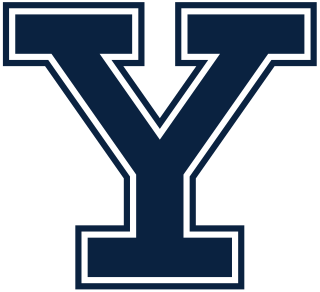
The Yale Bulldogs football program represents Yale University in college football in the NCAA Division I Football Championship Subdivision. Yale's football program, founded in 1872, is one of the oldest in the world. Since their founding, the Bulldogs have won 27 national championships, two of the first three Heisman Trophy winners, 100 consensus All-Americans, 28 College Football Hall of Fame inductees, including the "Father of American Football" Walter Camp, the first professional football player Pudge Heffelfinger, and coaching giants Amos Alonzo Stagg, Howard Jones, Tad Jones and Carmen Cozza. With over 900 wins, Yale ranks in the top ten for most wins in college football history.

The 1906 college football season was the first in which the forward pass was permitted. Although there was no clear cut national championship, there were two teams that had won all nine of their games as the 1906 season drew to a close, the Princeton Tigers and the Yale Bulldogs, and on November 17, 1906, they played to a 0–0 tie. St. Louis University finished at 11–0–0. The Helms Athletic Foundation, founded in 1936, declared retroactively that Princeton had been the best college football team of 1906. Other selectors recognized Yale as the national champions for 1906.
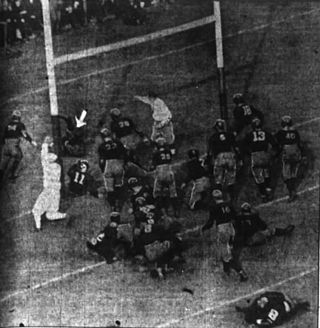
The 1922 college football season had a number of unbeaten and untied teams, and no clear-cut champion, with the Official NCAA Division I Football Records Book listing California, Cornell, Iowa, Princeton, and Vanderbilt as national champions. California, Cornell, and Princeton were all picked by multiple selectors.

The Harvard Crimson football program represents Harvard University in college football at the NCAA Division I Football Championship Subdivision. Harvard's football program is one of the oldest in the world, having begun competing in the sport in 1873. The Crimson has a legacy that includes 13 national championships and 20 College Football Hall of Fame inductees, including the first African-American college football player William H. Lewis, Huntington "Tack" Hardwick, Barry Wood, Percy Haughton, and Eddie Mahan. Harvard is the tenth winningest team in NCAA Division I football history.
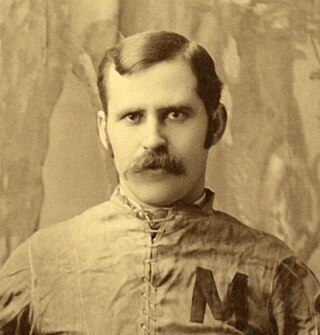
Horace Greely Prettyman was an American football player in the early years of the sport. Prettyman won a record eight varsity letters at the University of Michigan, playing for the school's football team from 1882 to 1886 and 1888 to 1890. He was the team's captain in 1884, 1885, and 1886, and scored the first touchdown in the first game played at Michigan's first home football field in Ann Arbor. Prettyman later became a successful businessman and civic leader, operating a boarding house, a laundry service, a power company and the Ann Arbor Press, and holding office as an Ann Arbor city councilman, postmaster and Washtenaw County, Michigan supervisor.

The 1884 Michigan Wolverines football team represented the University of Michigan in the 1884 college football season. The team compiled a 2–0 record and outscored its opponents by a combined score of 36 to 10. The team captain was Horace Greely Prettyman. Prettyman played a record eight years on the Michigan Wolverines football team between 1882 and 1890. The team's manager and starting center was Henry Killilea. Killilea was one of the five men who founded baseball's American League as a major league in 1899. He also owned the Boston Red Sox from 1903 until 1904. Quarterback Thomas H. McNeil went on to become the 30th Grand Chancellor of the Knights of Pythias.

The 1882 Michigan Wolverines football team represented the University of Michigan in the 1882 college football season. The team played no outside games. The captain of the 1882 team was William J. Olcott.

The 1879 Michigan Wolverines football team represented the University of Michigan in the 1879 college football season. The team was the first intercollegiate football squad to represent the University of Michigan. They played two games, winning one and tying the other. In its first intercollegiate football game, Michigan defeated a team from Racine College. Irving Kane Pond scored the first touchdown, and team captain David DeTar scored the first point and the first field goal.

The 1880 Michigan Wolverines football team represented the University of Michigan in the 1880 college football season. The team was the second intercollegiate football team to represent the University of Michigan. They played one game, defeating the team from the University of Toronto, 13 to 6, at the Toronto Lacrosse Club. Michigan scored two touchdowns and one goal; Toronto scored three safety touchdowns.
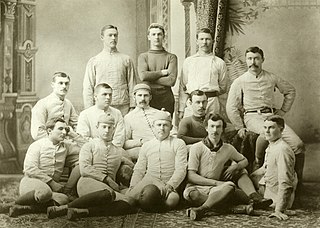
The 1883 Michigan Wolverines football team represented the University of Michigan in the 1883 college football season. The Wolverines played their only home game at the Ann Arbor Fairgrounds.

The 1893 college football season was the season of American football played among colleges and universities in the United States during the 1893–94 academic year.

Frederick Townsend was an American football player, lawyer and politician.

The History of Michigan Wolverines football in the early years covers the history of the University of Michigan Wolverines football program from its formation in the 1870s through the hiring of Fielding H. Yost prior to the 1901 season. Michigan was independent of any conference until 1896 when it became one of the founding members of the Western Conference. The team played its home games at the Washtenaw County Fairgrounds from 1883 to 1892 and then at Regents Field starting in 1893.
The 1881 Princeton Tigers football team represented the College of New Jersey, then more commonly known as Princeton College, in the 1881 college football season. The team finished with a 7–0–2 record and was retroactively named national champion by the Billingsley Report and as co-national champion by Parke H. Davis. This season marked Princeton's 11th national championship in a 13-year period between 1869 and 1881. P. T. Bryan was the captain of the team.
The 1881 Harvard Crimson football team represented Harvard University in the 1881 college football season. They Crimson compiled a record of 6–1–1. The team was managed by first-year head coach, Lucius Littauer, and captained for the second year by William H. Manning.
The 1882 Harvard Crimson football team represented Harvard University in the 1882 college football season. They finished with an 8–1 record.

The 1875 Yale Bulldogs football team represented Yale University in the 1875 college football season. The Bulldogs finished with a 2–2 record. The team won games against Rutgers and Wesleyan and lost to Harvard and Columbia.

The 1874 Harvard vs. McGill football game was a two-game series between the Harvard Crimson and the McGill Redmen held in Cambridge, Massachusetts, on May 14 and 15, 1874.

The early history of American football can be traced to early versions of rugby football and association football. Both games have their origin in varieties of football played in Britain in the mid–19th century, in which a football is kicked at a goal or run over a line, which in turn were based on the varieties of English public school football games.
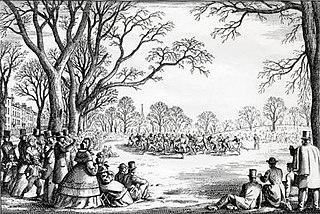
The Boston game, also known as the Boston rules, was an early code of football developed by the Oneida Football Club, formed in 1862 and considered by some historians as the first formal "football" club in the United States. Rules allowed carrying and kicking and is considered the first step to the codification of rules for association football, rugby football, or American football. After Oneida disbanded, former members established the Harvard University Football Club, which continued to play football under those rules.




















